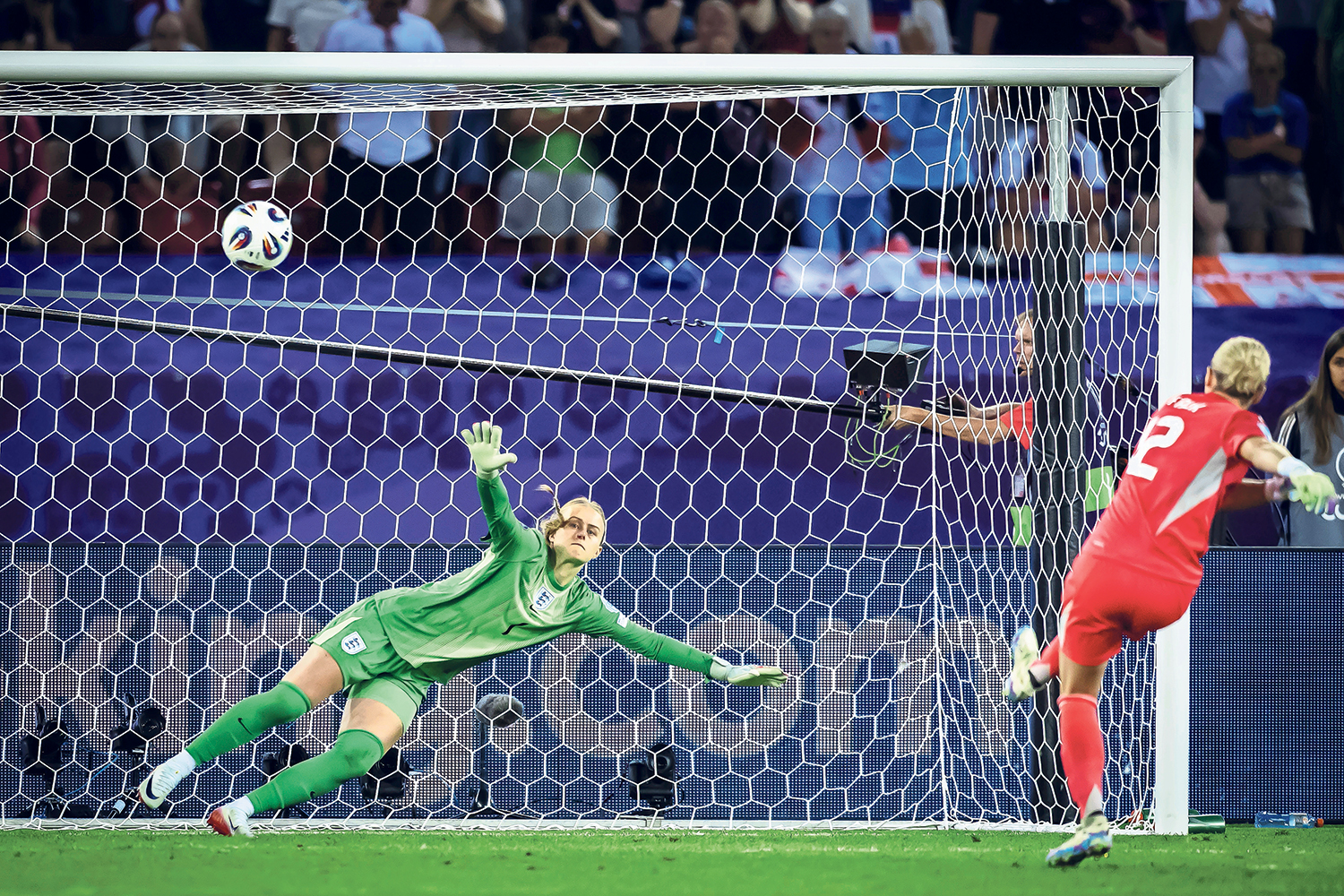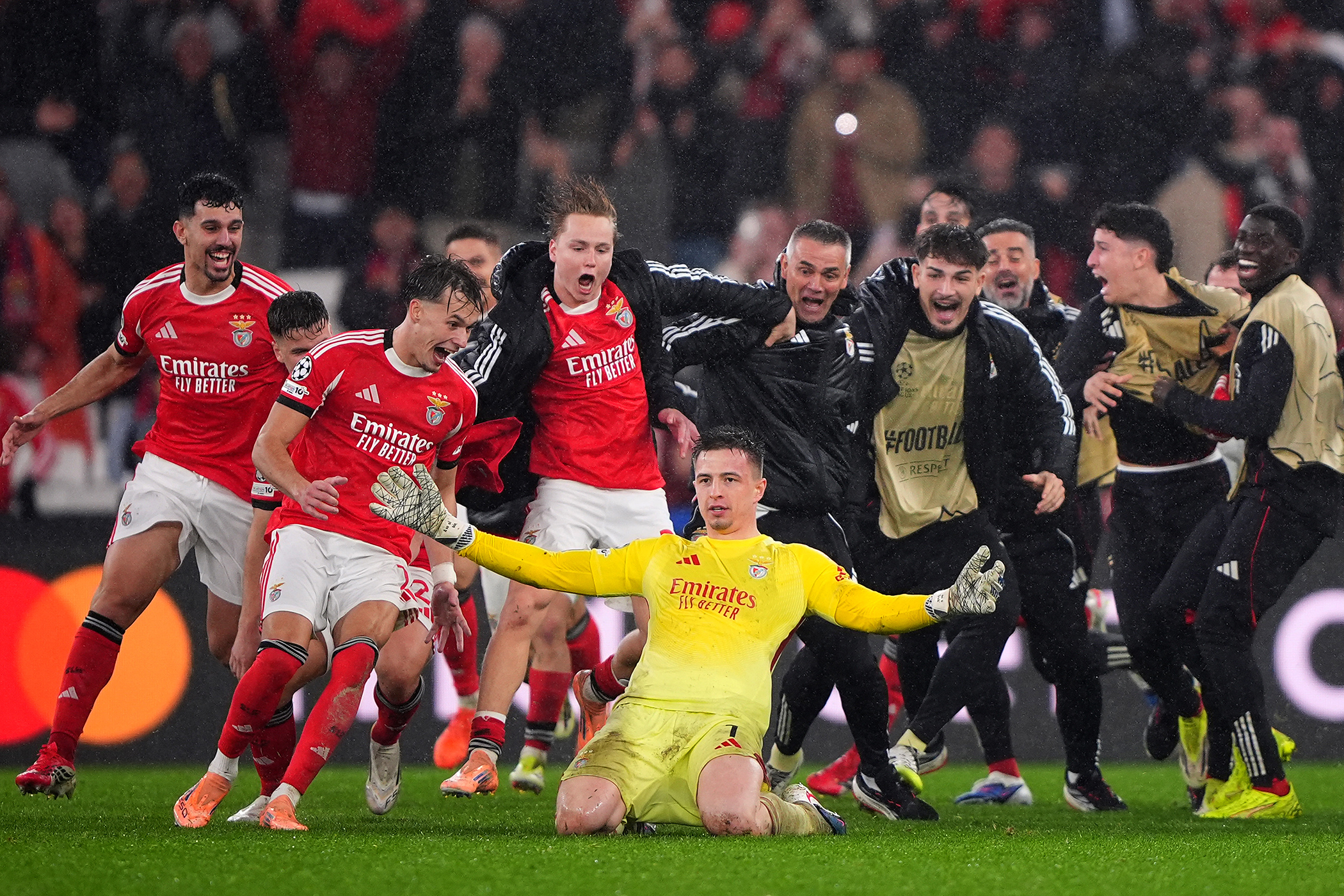When Chloe Kelly stepped up to take a penalty in extra time in England’s semi-final against Italy, she was taking the 44th spot-kick of Euro 2025. Although she scored the rebound, sending England into the final, the fact her initial effort was saved meant that it was the 21st missed penalty of the tournament. Only 52% have been scored.
Penalties have been a key talking point in Switzerland. The inaugural Ballon d’Or winner Ada Hegerberg missed two for Norway. Mariona Caldentey and Alexia Putellas missed one each for Spain in their quarter-final against Switzerland.
Sjoeke Nüsken scored one for Germany in the group stages, before missing in the quarter-final against France and then scoring in the penalty shootout in that match. And of course, there was the melodrama of England and Sweden in the quarter-finals when the two teams missed nine penalties between them, scoring only five out of 14. Whether it was the weak attempts by Grace Clinton and Lauren James, or Magda Eriksson skewing her penalty wide, it felt like no one wanted or was capable of winning the shootout. Sweden twice fluffed their lines, leaving Lucy Bronze to score the important penalty for England.
It is as if a penalty malaise has affected the tournament. The more penalties that are being missed, the more players are beginning to worry about missing them. The expectation has become that you are more likely to miss than score and it is rubbing off on players.
“It could very well be the case that the pressure that these players are feeling is higher than what they are used to because of the huge explosion of interest in the women’s game,” says Geir Jordet, author of Pressure: Lessons from the Psychology of the Penalty Shootout.
“This is peaking at this particular tournament where these players are representing their countries, which also adds more pressure than even playing an important Champions League game.”
This year’s Euros has been the best attended ever, with a record of 623,088 spectators even before today’s final. That is 50,000 more than attended Euro 2022 and all but two matches have been sold out.
It is undeniable that there is more attention on this tournament than ever before, but even then it has been surprising to see misses by experienced and good penalty takers, such as Spain’s Caldentey or Kelly, particularly if they have scored earlier in the tournament. “What you want is a player who is so confident and robust in her mindset that whatever happened on that previous shot doesn’t matter because they are so process- and task-focused in that moment that they refocus everything on that,” Jordet says.
Related articles:
With someone like Kelly, that is shown in the way she spins the ball before putting it down on the penalty spot and the specific actions of her run-up.
“Generally, statistically, if you missed your previous penalty kick, your performance will suffer on your next one. What you do then is whatever is in your power to focus everything you have on what’s happening now. If you have a very robust shot routine, if you have strong belief in yourself in general as a penalty taker, that will probably carry you quite far.”
Newsletters
Choose the newsletters you want to receive
View more
For information about how The Observer protects your data, read our Privacy Policy
Jordet also thinks that the way the women’s game has developed is contributing to the below average penalty success at the tournament.
“The pressure on a penalty tends to be on the penalty taker,” he says. “Goalkeepers in that moment have less pressure because the expectation is that the penalty is scored. Because of the increased professionalism in the women’s game, players are better prepared.
“It’s easier to prepare goalkeepers for penalty kicks than it is to prepare penalty takers. I think they’ve done that to a level that we’ve not previously seen in the women’s game before now. And if you add the increased pressure, you will fall back on your known and comfortable technique, so you will be predictable.
“Some of the penalty takers in this tournament have been too predictable, because they have a safe kick. They have a way they like to take penalties and that makes them easy to read. They’re not able to be flexible with it.
“Something we have seen in the men’s game that has increased over the past three to five years is the goalkeeper dependent technique where you look at the goalkeeper when you step up to the ball and let the goalkeeper make the first move, and then you roll the ball to the other side.”
In men’s international tournaments about 30% of penalties are taken this way but in the women’s game, it is only 3%. The only player to use this technique at the Euros so far is Caldentey against Switzerland, although the goalkeeper still dived the right way and Caldentey still actually missed, hitting her penalty wide of the lefthand post.
Perhaps one of the most surprising elements has been that some of the best players at the tournament have struggled, such as Putellas and Hegerberg. Few would expect 21-year-old centre-back Alice Sombath to score for France but you expect Ballon d’Or winners to.
“A penalty kick specialist is exactly that,” says Jordet. “Being a fantastic football player does not necessarily translate to becoming a fantastic penalty taker. In general, being a good penalty taker is about polishing and perfecting that specific craft, which is something you have to do with countless hours of quality practice. You need a robust mindset and a strong routine, and you have to experience it, test it and learn from it. If you approach it expecting that it is just going to work, you’re going to be very disappointed.”
Today’s final between England and Spain could pose an interesting question in terms of penalty takers given that both sides have had high-profile players miss. Whatever happens, it has undoubtedly been a tournament that will have some players thinking they need to do a bit more practice.
Photograph by Michael Buholzer/AP



